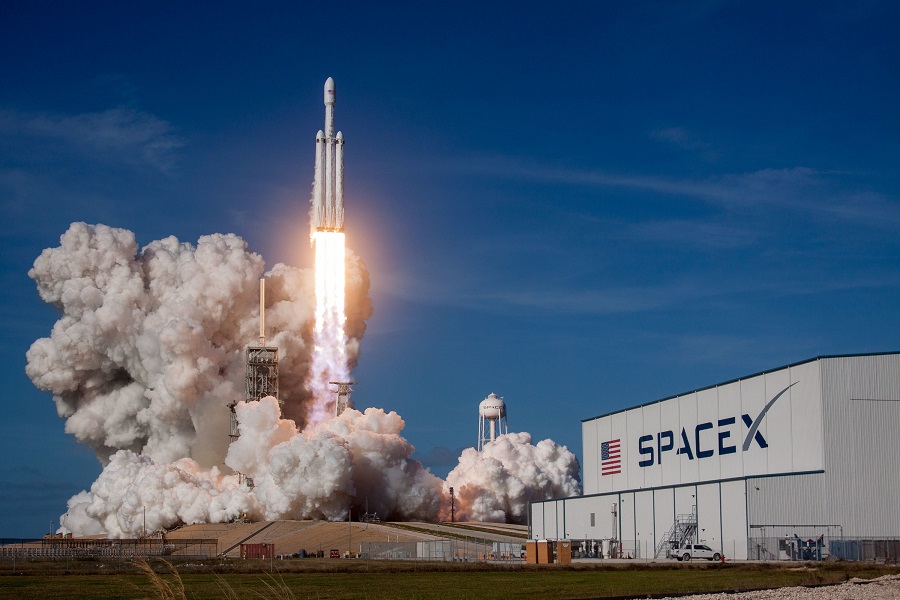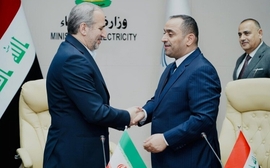Kazakhstan plans to launch two small satellites into Earth’s orbit this month using the launch pad at the Vandenberg base located in Santa Barbara, California. For the first time Kazakhstan will use an American-made rocket carrier for its satellites, forgoing Russia’s Proton launchers, which it had used in the past.
“If everything goes as planned, we will launch two satellites on November 19, from the California-based Falcon-9 launch vehicle,” Marat Nurgozhin, Vice Minister of Kazakhstan’s Defense and Aerospace Industry said Monday, according to Kazinform.
An American-made Falcon-9 two-stage launch vehicle, which was designed by Elon Musk’s company SpaceX, will carry the satellites into space, where three other Kazakhstani satellites are currently in operation. The satellites are already in the United States and are ready for launching, according to a report issued by the country’s defense and aerospace industry agency.
The first satellite, KazistiSat, is an imaging microsatellite that will be used to take high-resolution aerial photographs around the globe and is said to have a resolution of 17m. It weighs 100 kg and was developed by a joint team representing the Kazakhstani company Ghalam and British Surrey Satellite Technologies. The second satellite, KazSaySat, was designed by Kazakhstani developers and will study the ionosphere, the area of Earth’s atmosphere where terrestrial weather meets space weather.
Central Asia’s largest country opted for SpaceX because their proposal for the project seemed best suited to Kazakhstan’s needs.
“Why we have chosen Falcon-9 this time? Because it was cheaper to launch using Falcon-9,” Aset Nurkenov, a spokesperson for the Kazakhstani defense and aerospace industry ministry said Tuesday, according to Interfax. The cost of the launch has not been disclosed at SpaceX’s request.
Nurkenov said the fact that Kazakhstan opted for SpaceX does not mean a complete refusal of services provided by Russia’s Roscosmos. He said Kazakhstan may still use Russia’s Soyuz and Proton rockets for future operations.
“We plan to launch [satellites] from Kazakhstan, it is possible. We think spacecraft of such a configuration can be launched by carrier rockets like Soyuz or Proton, whose launches are carried out from Baikonur,” Nurkenov said, referring to Kazakhstan’s sole cosmodrome and the world’s first and largest operational space launch facility.
During the Soviet era Kazakhstan was home to the Soviet space program. Today, Kazakhstan continues to be engaged in high-tech projects, including space systems.
Kazakhstan’s very first satellite, KazSat-1, went into orbit for a 12-year mission after being transported to space via the Russian-made Proton-K launcher in 2006. In 2011 and 2014, the country launched its second and third telecommunication satellites, named KazSat-2 and KazSat-3, respectively. Both were designed to broaden the scope of information services provided to the region, including mobile and internet connections, and helped satisfy the demand within Kazakhstan for broadband systems.
Officials in Astana believe that the upcoming launch will help develop domestic production, while manufacturing satellites in Kazakhstan will become significantly cheaper.
“Our [spacecraft] will get a flight history and allow commercializing and creating our own satellites here. These will be communications satellites, which will replace the existing devices,” Nurgozhin said on Monday.
Meanwhile, Kazakhstan is getting ready to open a spacecraft assembly and test complex in Astana by the end of this year. According to the ministry the complex will design, assemble and test satellites weighing between 100 kilograms to six tons, as well as manufacture components for satellites. All work will be carried out by Kazakhstani specialists.







 The Islamic holy month of fasting, Ramadan comes to an end this week with the celebration of a joyous festival called Eid (meaning “festival” in Ar...
The Islamic holy month of fasting, Ramadan comes to an end this week with the celebration of a joyous festival called Eid (meaning “festival” in Ar...
 Azerbaijan officially unveiled the logo for the upcoming 29th session of the Conference of the Parties to the United Nations Framework Convention o...
Azerbaijan officially unveiled the logo for the upcoming 29th session of the Conference of the Parties to the United Nations Framework Convention o...
 Iranian President Ebrahim Raisi warned Israel that it would face a "real and extensive" response if it makes any "mistake" following Tehran’s missi...
Iranian President Ebrahim Raisi warned Israel that it would face a "real and extensive" response if it makes any "mistake" following Tehran’s missi...



